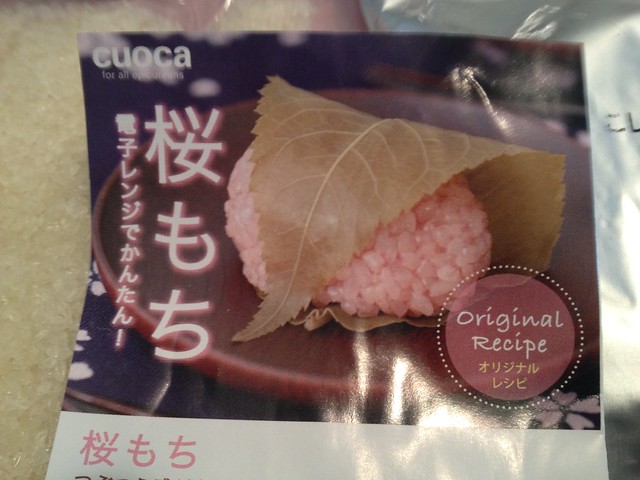
In Japan, everything is made easy for busy housewives who have to raise kids, clean the house, yet also have to cook and make dessert. You throw things in a microwave and five minutes later, you can a serve main course to your hungry kids and demanding, asshole husbands.
I was recently given a simple-to-make
sakuramochi kit. With sakura blossoms everywhere right now, this dessert is very springtime-y. Everything you need inside this cute pink bag:
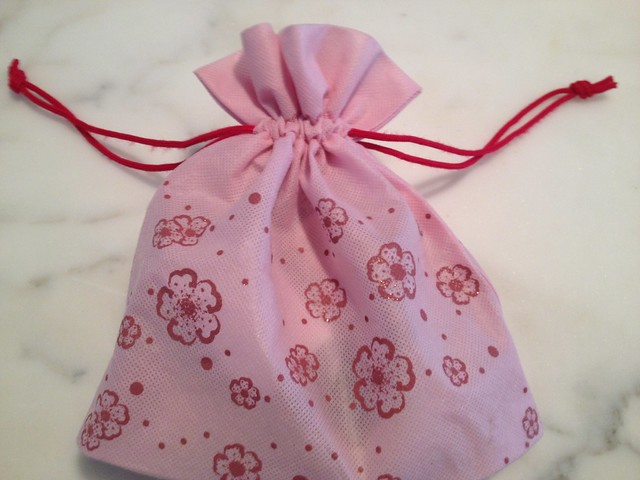 Sakuramochi
Sakuramochi is a kind of
wagashi (traditional Japanese confetion) in Japan, consisting of pink mochi and
anko (red bean paste) wrapped in a
sakura (cherry blossom) leaf.
Inside this bag, you can find all the ingredients to make
sakuramochi.
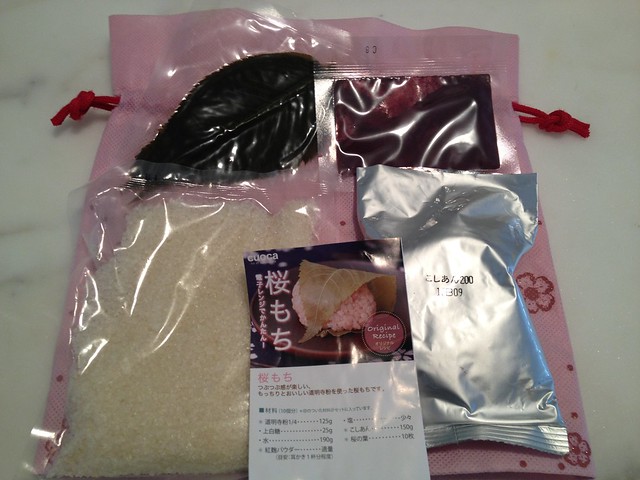 Salt pickled cherry blossom leaves, red dye, domyoji flour, anko, and instructions.
Salt pickled cherry blossom leaves, red dye, domyoji flour, anko, and instructions.
It is usually quite labor-intensive to make
sakuramochi from scratch, but this kit makes it easy.
Domyoji flour is a type of rice flour, made from course grains rather than smooth.
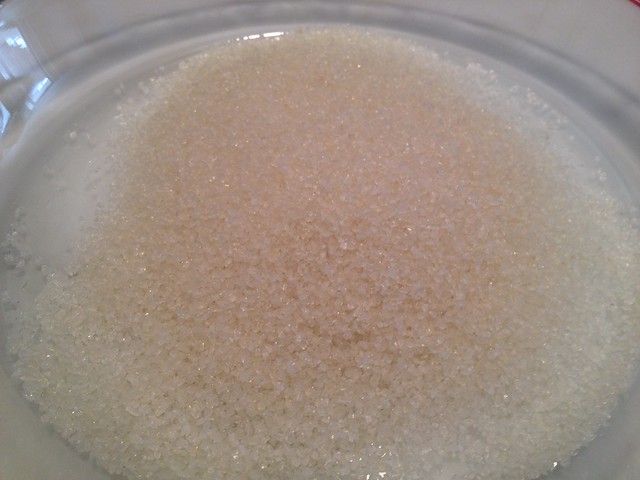
It looks like coarse sugar or salt, but it's actually mochi rice, soaked in water, then steamed and dried. Believe or not, it has a peculiar texture that is similar to
ikura (salmon roe).
Red dye in a tube:
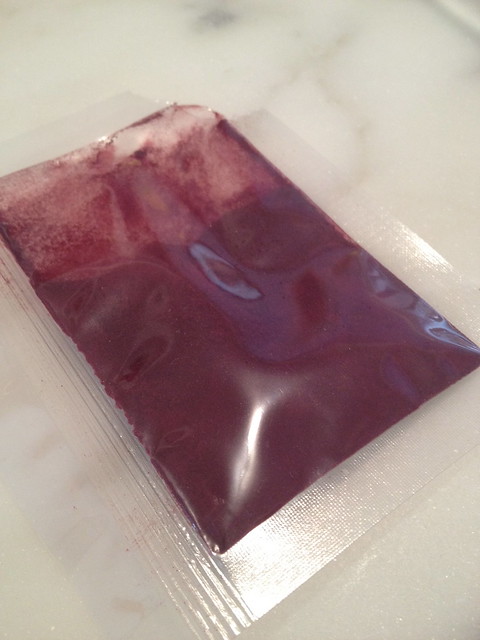
Mix water with red dye to make a cute pink color. Pour it over the flour and mix together well.
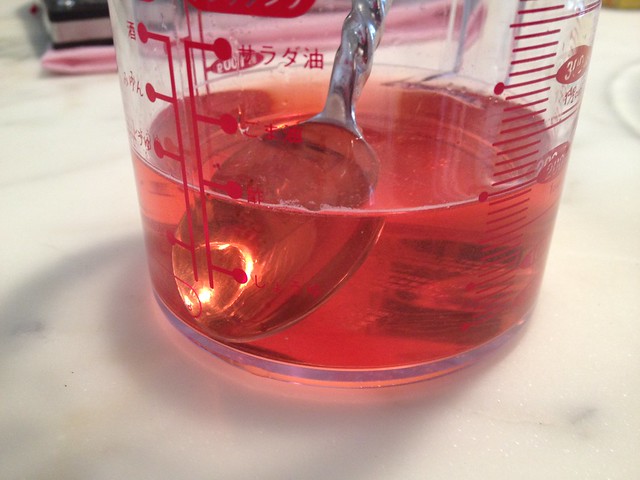
Tightly wrap with plastic wrap, and nuke it for about five minutes. The instructions said six minutes, but I think American microwaves are stronger than Japanese ones.
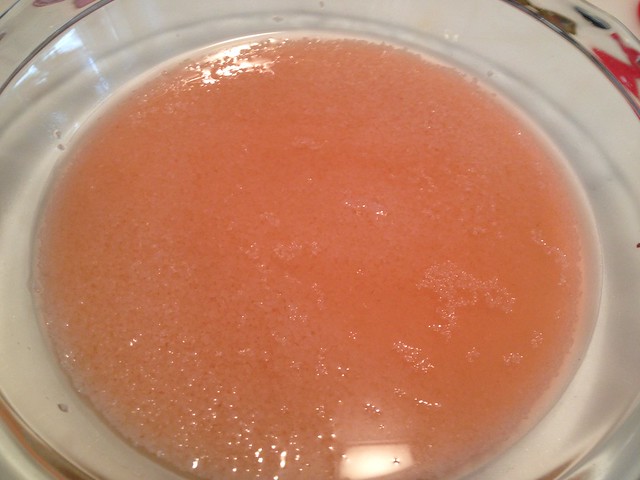
I nuked it for six minutes (Mistake #1).
Meanwhile, prepare other ingredients.
Soak
sakura leaves in water for about 10 minutes since they are a bit too salty as is.
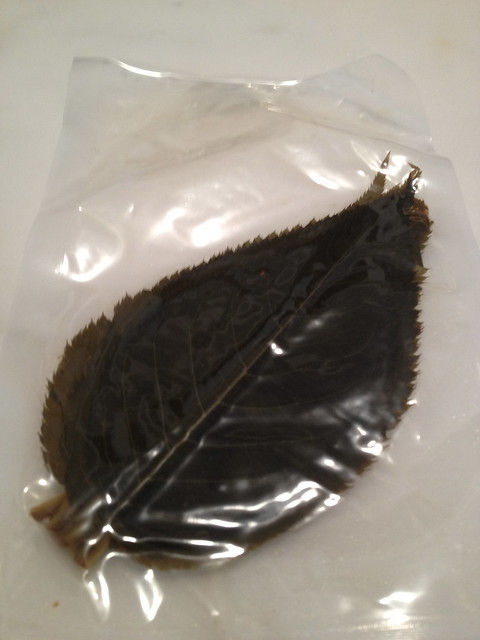
FYI, these leaves are edible.
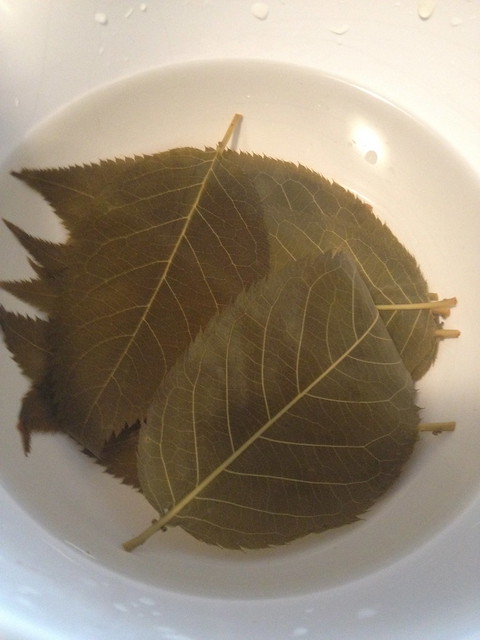
After about 10 minutes, dry them on a paper towel.
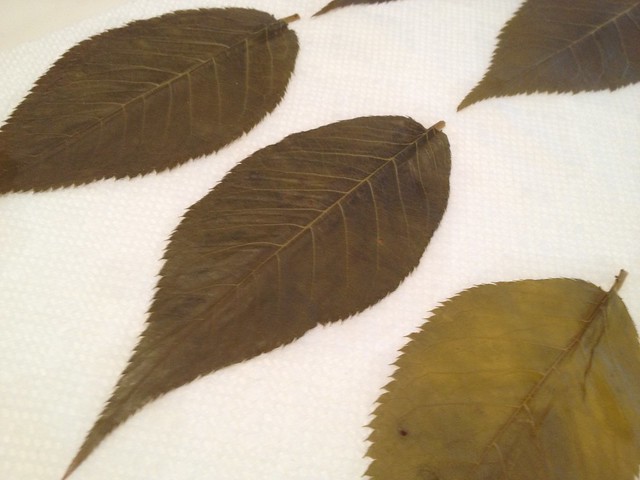 Anko
Anko (red bean paste) comes pre-made in a convenient bag. If you read my previous post on
how to make anko from scratch, you know what a pain in the ass this is to make.
The original instructions said to roll the
anko into balls, but I wanted to wrap it with strawberry (Mistake #2).
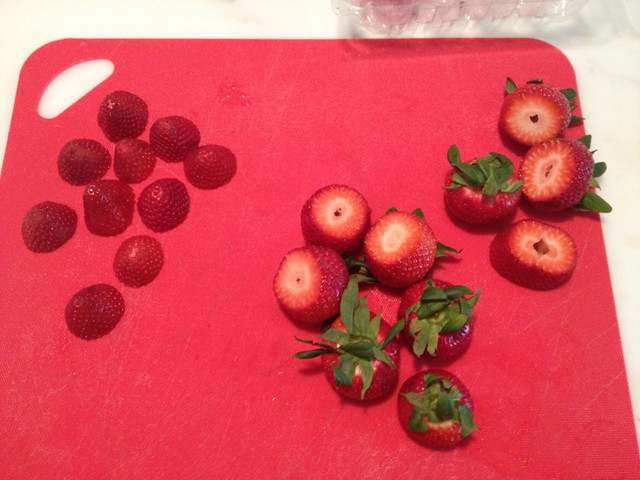
I used only the tips of the strawberries -- otherwise, it would be way too big. Then wrapped it with the
anko.
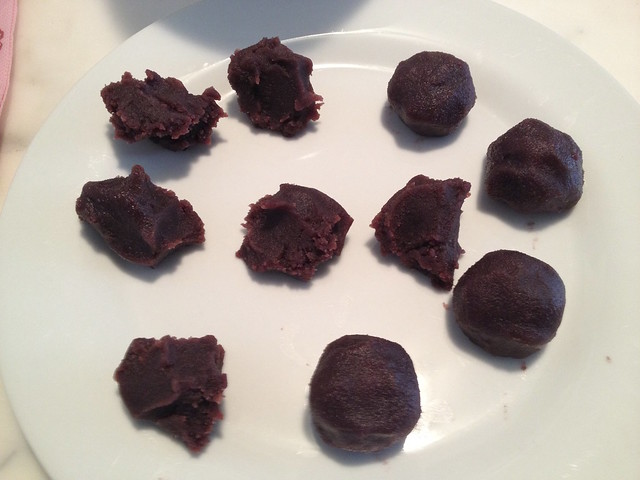
After microwaving the mochi rice, wait until it cools down a bit, then add sugar, and mix together.
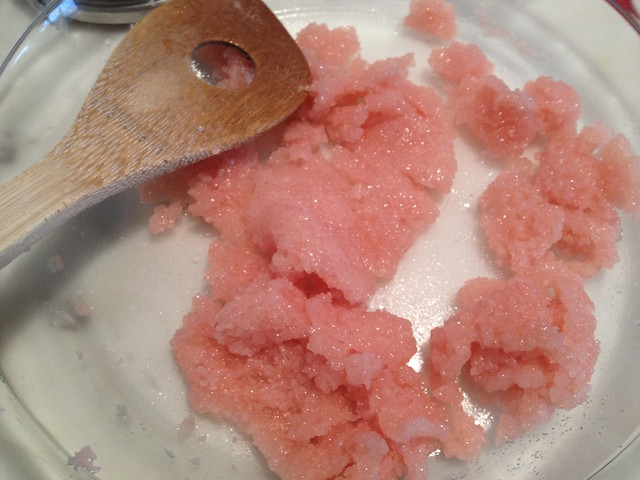
Since I over-microwaved the dough, it was very difficult to mix it together with the sugar.
Then put the dough on a piece of plastic wrap and shape it to a cylinder.
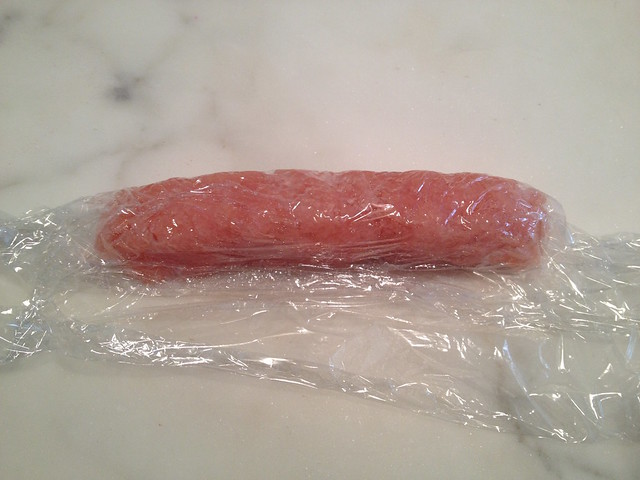
Then cut into 10 pieces.
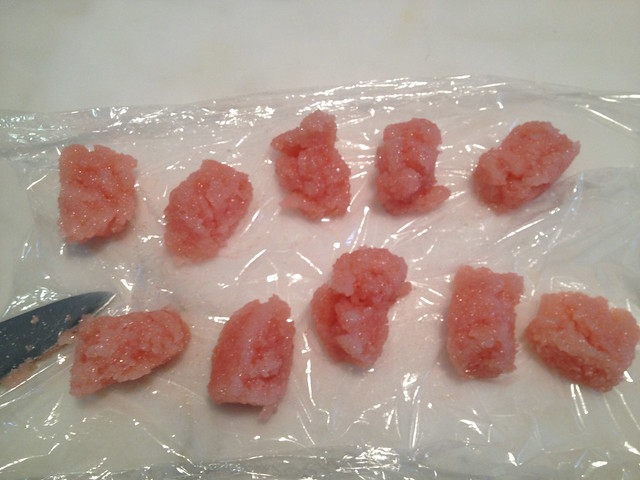
Wet your hands, and flatten the pink dough, then wrap it around the
anko ball.
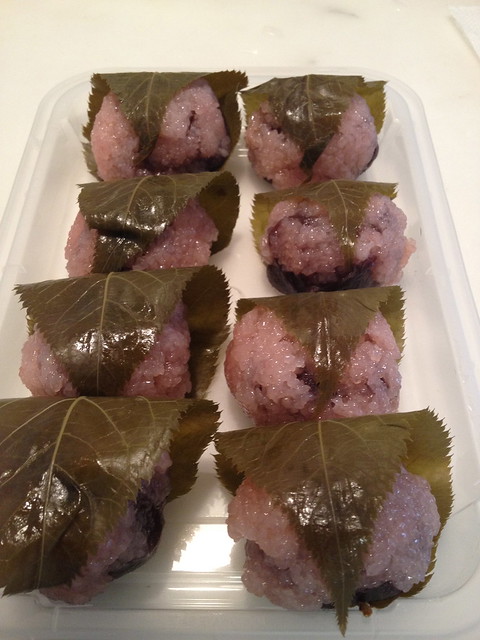
They don't look too bad, thanks to leaves that are hiding all the flaws, which are:
A. Because I added strawberry tips, the
anko balls were too big to be wrapped by mochi skin.
B. Because I over-microwaved the dough, some parts were over-cooked and almost hard.
Then it hit me. I am not a busy wife who is constantly pressured to serve her family gourmet meals. Also, when I make things, I usually start from scratch. I wouldn't make
domyoji flour from scratch, but I can make
anko from scratch, that's for sure.
Plus, when you are given exact amount of this and that, you can't deviate from the original recipe, which will cause major troubles.
I haven't tasted these yet, but I have a feeling they aredisappointing. Oh well. I like the idea that everything you need comes in a bag, but in reality, if you want to make something good, it takes time and effort.
 In Japan, everything is made easy for busy housewives who have to raise kids, clean the house, yet also have to cook and make dessert. You throw things in a microwave and five minutes later, you can a serve main course to your hungry kids and demanding, asshole husbands.
I was recently given a simple-to-make sakuramochi kit. With sakura blossoms everywhere right now, this dessert is very springtime-y. Everything you need inside this cute pink bag:
In Japan, everything is made easy for busy housewives who have to raise kids, clean the house, yet also have to cook and make dessert. You throw things in a microwave and five minutes later, you can a serve main course to your hungry kids and demanding, asshole husbands.
I was recently given a simple-to-make sakuramochi kit. With sakura blossoms everywhere right now, this dessert is very springtime-y. Everything you need inside this cute pink bag:
 Sakuramochi is a kind of wagashi (traditional Japanese confetion) in Japan, consisting of pink mochi and anko (red bean paste) wrapped in a sakura (cherry blossom) leaf.
Inside this bag, you can find all the ingredients to make sakuramochi.
Sakuramochi is a kind of wagashi (traditional Japanese confetion) in Japan, consisting of pink mochi and anko (red bean paste) wrapped in a sakura (cherry blossom) leaf.
Inside this bag, you can find all the ingredients to make sakuramochi.
 Salt pickled cherry blossom leaves, red dye, domyoji flour, anko, and instructions.
It is usually quite labor-intensive to make sakuramochi from scratch, but this kit makes it easy.
Domyoji flour is a type of rice flour, made from course grains rather than smooth.
Salt pickled cherry blossom leaves, red dye, domyoji flour, anko, and instructions.
It is usually quite labor-intensive to make sakuramochi from scratch, but this kit makes it easy.
Domyoji flour is a type of rice flour, made from course grains rather than smooth.
 It looks like coarse sugar or salt, but it's actually mochi rice, soaked in water, then steamed and dried. Believe or not, it has a peculiar texture that is similar to ikura (salmon roe).
Red dye in a tube:
It looks like coarse sugar or salt, but it's actually mochi rice, soaked in water, then steamed and dried. Believe or not, it has a peculiar texture that is similar to ikura (salmon roe).
Red dye in a tube:
 Mix water with red dye to make a cute pink color. Pour it over the flour and mix together well.
Mix water with red dye to make a cute pink color. Pour it over the flour and mix together well.
 Tightly wrap with plastic wrap, and nuke it for about five minutes. The instructions said six minutes, but I think American microwaves are stronger than Japanese ones.
Tightly wrap with plastic wrap, and nuke it for about five minutes. The instructions said six minutes, but I think American microwaves are stronger than Japanese ones.
 I nuked it for six minutes (Mistake #1).
Meanwhile, prepare other ingredients.
Soak sakura leaves in water for about 10 minutes since they are a bit too salty as is.
I nuked it for six minutes (Mistake #1).
Meanwhile, prepare other ingredients.
Soak sakura leaves in water for about 10 minutes since they are a bit too salty as is.
 FYI, these leaves are edible.
FYI, these leaves are edible.
 After about 10 minutes, dry them on a paper towel.
After about 10 minutes, dry them on a paper towel.
 Anko (red bean paste) comes pre-made in a convenient bag. If you read my previous post on how to make anko from scratch, you know what a pain in the ass this is to make.
The original instructions said to roll the anko into balls, but I wanted to wrap it with strawberry (Mistake #2).
Anko (red bean paste) comes pre-made in a convenient bag. If you read my previous post on how to make anko from scratch, you know what a pain in the ass this is to make.
The original instructions said to roll the anko into balls, but I wanted to wrap it with strawberry (Mistake #2).
 I used only the tips of the strawberries -- otherwise, it would be way too big. Then wrapped it with the anko.
I used only the tips of the strawberries -- otherwise, it would be way too big. Then wrapped it with the anko.
 After microwaving the mochi rice, wait until it cools down a bit, then add sugar, and mix together.
After microwaving the mochi rice, wait until it cools down a bit, then add sugar, and mix together.
 Since I over-microwaved the dough, it was very difficult to mix it together with the sugar.
Then put the dough on a piece of plastic wrap and shape it to a cylinder.
Since I over-microwaved the dough, it was very difficult to mix it together with the sugar.
Then put the dough on a piece of plastic wrap and shape it to a cylinder.
 Then cut into 10 pieces.
Then cut into 10 pieces.
 Wet your hands, and flatten the pink dough, then wrap it around the anko ball.
Wet your hands, and flatten the pink dough, then wrap it around the anko ball.
 They don't look too bad, thanks to leaves that are hiding all the flaws, which are:
A. Because I added strawberry tips, the anko balls were too big to be wrapped by mochi skin.
B. Because I over-microwaved the dough, some parts were over-cooked and almost hard.
Then it hit me. I am not a busy wife who is constantly pressured to serve her family gourmet meals. Also, when I make things, I usually start from scratch. I wouldn't make domyoji flour from scratch, but I can make anko from scratch, that's for sure.
Plus, when you are given exact amount of this and that, you can't deviate from the original recipe, which will cause major troubles.
I haven't tasted these yet, but I have a feeling they aredisappointing. Oh well. I like the idea that everything you need comes in a bag, but in reality, if you want to make something good, it takes time and effort.
They don't look too bad, thanks to leaves that are hiding all the flaws, which are:
A. Because I added strawberry tips, the anko balls were too big to be wrapped by mochi skin.
B. Because I over-microwaved the dough, some parts were over-cooked and almost hard.
Then it hit me. I am not a busy wife who is constantly pressured to serve her family gourmet meals. Also, when I make things, I usually start from scratch. I wouldn't make domyoji flour from scratch, but I can make anko from scratch, that's for sure.
Plus, when you are given exact amount of this and that, you can't deviate from the original recipe, which will cause major troubles.
I haven't tasted these yet, but I have a feeling they aredisappointing. Oh well. I like the idea that everything you need comes in a bag, but in reality, if you want to make something good, it takes time and effort.



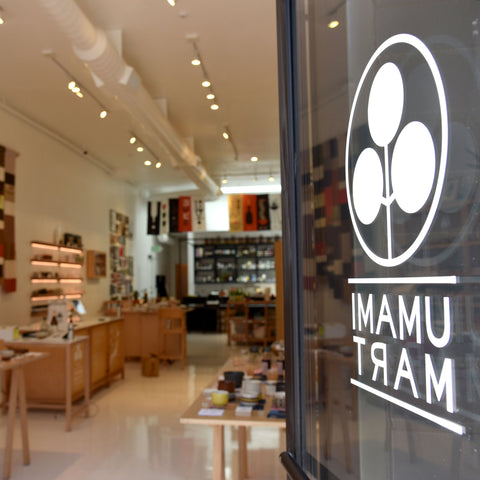
Comments (1)
I was so surprise by so many packaged “assembly-required” products in Japan. This sounds like a lot of work even if it’s a kit. How did it taste?